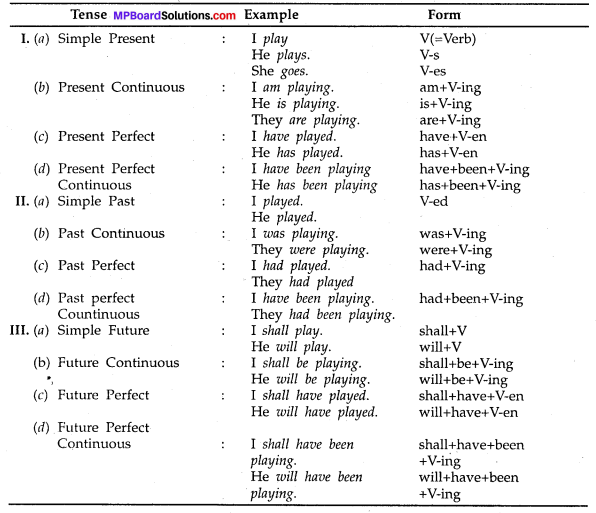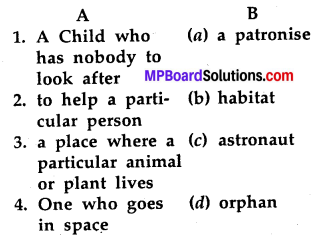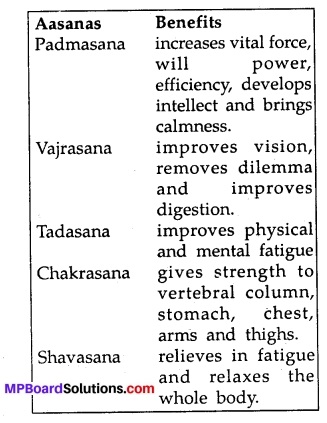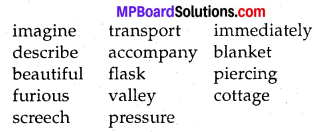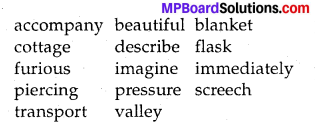Guys who are planning to learn the fundamentals of English can avail the handy study material using MP Board Solutions for Class 8 Special English Grammar Direct and Indirect Narration Questions and Answers. You Can Download MP Board Class 8 English Solutions Questions and Answers, Notes, Summary, Guide, Pdf. Refer to the Madhya Pradesh State Board Solutions for English PDF available and score better grades. Simply click on the quick links available for MP Board Solutions for Class 8 Special English Grammar Direct and Indirect Narration Questions and Answers and prepare all the concepts in it effectively. Take your preparation to the next level by availing the Madhya Pradesh State Board Solutions for Class 8 English prepared by subject experts.
MP Board Class 8th Special English Grammar Direct and Indirect Narration
Do you feel the concept of English is difficult to understand? Not anymore with our MP Board Solutions for Class 8 Special English Grammar Direct and Indirect Narration Questions and Answers. All the Solutions are given to you with detailed explanation and you can enhance your subject knowledge. Use the Madhya Pradesh State Board Solutions for Class 8 English PDF for free of cost and prepare whenever you want.
किसी व्यक्ति की कही हुई बात को हम दो प्रकार से लिखते हैं –
1. कहने वाले के मूल शब्दों में लिखना। इसे Direct Speech कहते हैं। ये शब्द सदैव Inverted Commas “…” में बन्द रहते हैं। जैसे –
Ram says, “I am going.”
2. कहने वाले की बात को अपने शब्दों में लिखना। इसे Indirect Speech कहते हैं। इसमें Reporting verb का comma तथा Inverted Commas “…” का लोप कर दिया जाता है। जैसे –
Ram says that he is going.
Two Parts of Direct Speeches
1. Inverted Commas से पूर्व वाला भाग जिससे वाक्य को आरम्भ करते हैं, इसे Reporting Verb कहते हैं। जैसे उपर्युक्त उदाहरण में Ram says Reporting verb है।
2. Inverted Commas के अन्दर लिखा हुआ कथन Reported Speech कहलाता है। जैसे उपुर्यक्त भाग में “I am going” Reported Speech है। Direct से Indirect बनाते समय Personal Pronouns का परिवर्तनः
नियम – Reported Speech में प्रयोग किये गए first person-I, my, me, we, us, our के Pronouns को Reporting Verb के Subject के Person के अनुसार बदल देते हैं। जैसे –
Direct : The teacher says, “I am writing a letter.”
Indirect: The teacher says that he is wiriting a letter.
उपयुक्त वाक्यों में वक्ता teacher, है,जिसने अपने लिए ‘I’ का प्रयोग किया है। Indirect Speech में teacher के third person के अनुसार subject बदलकर he हो गया है।
नियम – Reported Speech Second Person Pronouns के You, Your, Reporting Verb के Object के Person के अनुसार बदल देते हैं। जैसे –
Direct: You said to me, “You are an honest man.”
Indirect: You told me that I was an honest man.
Direct: He said to him, “You have helped me.”
Indirect: He told him that he had helped him.
Direct: He said, “You never helped me.”
Indirect: He said that he never helped him.
Direct: I said to you, “You are ill.”
Indirect: I told you that you were ill.
Direct: I said to him, “You killed a snake.”
Indirect: I told him that he had killed a snake.
Rule: Indirect Speech में बदलते समय Third Person के Pronouns में कोई परिवर्तन नहीं होता। जैसे –
Direct: He said, “He will go there.”
Indirect: He said that he would go there.
Direct: He said, “They will go there.”
Indirect: He said that they would go there.”
Change of Tenses
Rule: यदि Reporting Verb भूतकाल में हो तो Reported Speech की क्रिया नीचे लिखे नियमानुसार बदल जाती है –
Go, goes – is changed into went
is, are – is changed into was, were
has or have – is changed into had
has been or have been going – is changed into has been going
went – had gone
was or were going – is changed into had been going
will or shall – is changed into would or should
can – is changed into could
may – is changed into might
has and had – is changed into had
was and were – is changed into had been.
Change of Tenses
Assertive Sentences
Rule. यदि Reporting Verb Present या Future Tense में हो, तो Reported Speech के Verb का Tense नहीं बदलता।
Examples :
Direct : The boy says, “I am playing.”
Indicet : The boy says that he is playing.
Direct: Sita will say, “I write a letter.”
Indirect : Sita will say that she writes a letter.
Direct : The boy said, “I write a letter.”
Indirect : The boy said that he wrote a letter.
Direct : Hari said, “I am playing.”
Indirect : Hari said that he was playing.
Direct : The servant said, “I have swept the room.”
Indirect : The servant said that he had swept the room.
Direct : The boy said, “We have been playing for two hours.”
Indirect : The boys said that they had been playing for two hours.
Direct : The tailor said, “I pressed the clothes.”
Indirect : The tailor said that he had pressed the clothes.
Direct : My mother said, “I was cooking food.”
Indirect : My mother said that she had been cooking food.
Change of Auxiliary Verbs
Rule: of Reporting Verb में Auxiliary Verbs आये हैं, तो उनका परिवर्तन निम्न प्रकार से होगा।
Examples:
Direct: The boy said, “I am a good student.”
Indirect: The boy said that he was a good student.
Direct: Sita said, “I have a pen.”
Indirect: Sita said that she had a pen.
Direct: He said, “I do not go.”
Indirect: He said that he did not go.
Direct: He said, “I cannot go there.”
Indirect: He said that he could not go there.
Direct: I said to him, “I shall teach you.”
Indirect: I told him that I shall (would) teach him.
Exercise
Convert the following sentences into Indirect Speech:
- I say, “I do my work daily.”
- Hari says, “I am working hard for the examination.”
- You say, “I know Ravi and his father.”
- Gopal said, “I have done my work.”
- She said, “I cannot learn the lesson so soon.”
- Anil said, “I daily get up at four in the morning.”
- My mother said to me, “I am cooking food for you.”
- These boys said, “We have been playing since moring.”
- Vinod said, “My brother plays cricket.”
- The naughty girl said, “I have plucked flowers.”
Interrogative Sentences
Rule: जब प्रश्नवाचक वाक्यों को Direct से Indirect Speech में बदलते हैं, तो निम्नलिखित परिवर्तन किया जाता है –
- Reporting Verb say अथवा tell को asked में बदल दिया जाता है।
- यदि प्रशानवाचक वाक्य where, why, what, which, when, who आदि में से किसी एक से आरम्भ होता है, तो that या if का प्रयोग नहीं किया जाता है।
- यदि वाक्य is, am, are, have, has, had, was, were, will, shall अथवा किसी अन्य सहायक क्रिया से आरम्भ होता है, तो Indirect Speech में if का प्रयोग नहीं किया जाता है।
Example:
A
Direct: He said to the beggar, “What do you want?”
Indirect: He asked the beggar what he wanted.
Direct: The teacher said to Mohan, “Why are you late for school today?”
Indirect: The teacher enquired of Mohan why he was late for the school that day.
В
Direct: I said to him, “Is your father at home?”
Indirect: I asked him if his father was at home.
Direct: The teacher said, “Hari did you bathe this morning?
Indirect: The teacher inquired of Hari if he had bathed that morning.
Direct: Harbans said to you, “Will you accompany me to Simla tomorrow?”
Indirect: Harbans asked you whether you would accompany him to Simla next day.
Exercise
Change the follwoing sentences into Indirect Speech:
- You said to him, “What can I do for you?”
- She said to Bimla, “Which school do you attend?”
- I said to Hari, “How many boys are there in your class?”
- He said to his friend, “When shall I call on you again?”
- He said to me, “Where shall I wait for you?
- Sohan said to Mohan, “Do you play foot-ball daily?”
- The teacher said to the girl, “Have you done your home-work?”
- She said to Bimla, “Does this book belong to you?”
- He said to me, “Are you on speaking terms with your neighbour?”
- Satish said, “Father, may I go to the picture today?”
Imperative Sentences
Rule: Imperative sentences में आदेश,आग्न्या,शिक्षा तथा प्रार्थना पायी जाती है, जैसे वाक्यों को Indirect मै बदलते समय Said to के स्थान पर ordered, advised, requested, proposed, forbade आदि शब्द लगाओ।
Rule: That का प्रयोग मत करो।
Rule: Verb के पूर्व To लगाओ। “Do not” को “not to” में बदल दो।
Examples:
A
Direct: The teacher said to Balbir, “Look at the black-board.”
Indirect: The teacher asked Balbir to look at the black-board.
Direct: He said to the servant, “Light the lamp atonce.”
Indirect: He ordered the servant to light the lamp atonce.
Direct: The general said to his men, “Stand at ease.”
Indirect: The general ordered his men to stand at ease.
Direct: He said to me, “Give me your knife.”
Indirect: He requesed me to give him my knife.
Direct: I said to him, “Please wait here for me till I return.”
Indirect: I requested him to wait there for me till I returned.
Direct: She said to her maid-servant, “Let the beggar come in.”
Indirect: She ordered her maid-servant to let the beggar come in.”
Direct: He said to his companions, “Let me go on with my work, please.”
Indirect: He requested his companions to let him go with his work.
Direct: He said, “Let us go out for a walk.”
Indirect: He proposed that they should go out for a walk.
Exercises
Change the following sentences into Indirect Speech:
- I said to Raj, “Show me your new book.”
- The teacher said to the boys, “Sit down and revise your lesson.”
- The fox said to the crow, “Please sing me a song.”
- He said to you, “Do attend my marriage.
- Father said to me, “Respect your elders.”
- I said to him, “Be quiet and listen to me.” (Use ‘urge’)
- “Don’t do that again, or you will get into troubles,” said the old lady.
- I said to my cousin, “Let us set out for Shimla tomorrow.”
- Surender said, “Let this boy go out to play.”
- Guru said to his disciples, “Do not mix with liars.”
Optative and Exclamatory Sentences
Rule: (i) Optative sentences में Reporting Verb के स्थान पर exclaimed with joy, sorrow, surprise आदि का प्रयोग किया जाता है। (ii) Optative Sentences में Reporting Verb के स्थान पर pray, wish आदि शब्दों का प्रयोग किया जाता है।
Examples:
Direct: She said, “May you live long, my daughter!”
Indirect: She wished that her daughter might live long.
Direct: He said to me, “May God bless you with a son!”
Indirect: He wished that God might bless me with a son.
Direct: Sohan said, “O that I were a rich man’s son.”
Indirect: Sohan wished that he were a rich man’s son.
Direct: Jagjit said, “What a terrible storm it is !”
Indirect: Jagjit exclaimed that is was a very terrible storm.
Direct: I said, “How fat he is !
Indirect: I exclaimed that he was very fat.
Direct: “Hurrah ! We are winning!” shouted the boys.
Indirect: The boys exclaimed with joy that they were winning.
Direct: Balbir said, “Alas! All my friends have deserted me.”
Indirect: Balbir exclaimed with sorrow that all his friends had deserted him.
Direct: Bimla said, “Alsa! How foolish I have been !”
Indirect: Bimla confessed with regret that she had been very foolish.
Direct: The Inspector said, “Bravo! Well played, Raj.”
Indirect: The Inspector applauded (or praised) Raj, saying that he had played well.
Direct: “Good night to you all,” said Harnam.
Indirect: Harnam wished them all good night.
Exercises
Change the following sentences into Indirect Speech:
- They said to me, “May you be happy!”
- I said to him, “May God help you in his matter !”
- They said, “How sweetly the Cuckoo sings !”
- He said to me, “May you succeed !”
- She said, “Hurrah! I have won a prize in a lottery.”
- You said, “Alas! I shall ‘fail.”
- Hari cried, “O that I were dead !”
- He said, “Alas! What a loss I have suffered !”
- The man said, “What a fool I have been.”
- He said, “Bravo! Well done, Ramu.”
We wish the knowledge shared regarding MP Board Solutions for Class 8 Special English Grammar Direct and Indirect Narration Questions and Answers has been helpful to you. If you need any further help feel free to ask us and we will get back to you with the possible solution. Bookmark our site to avail the latest updates on different state boards solutions in split seconds.
